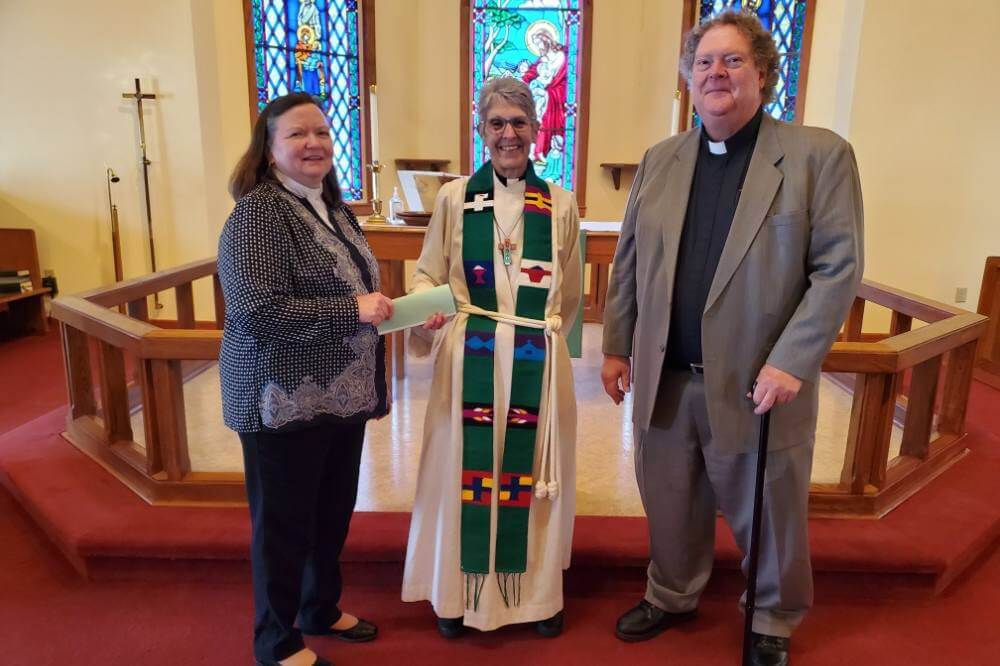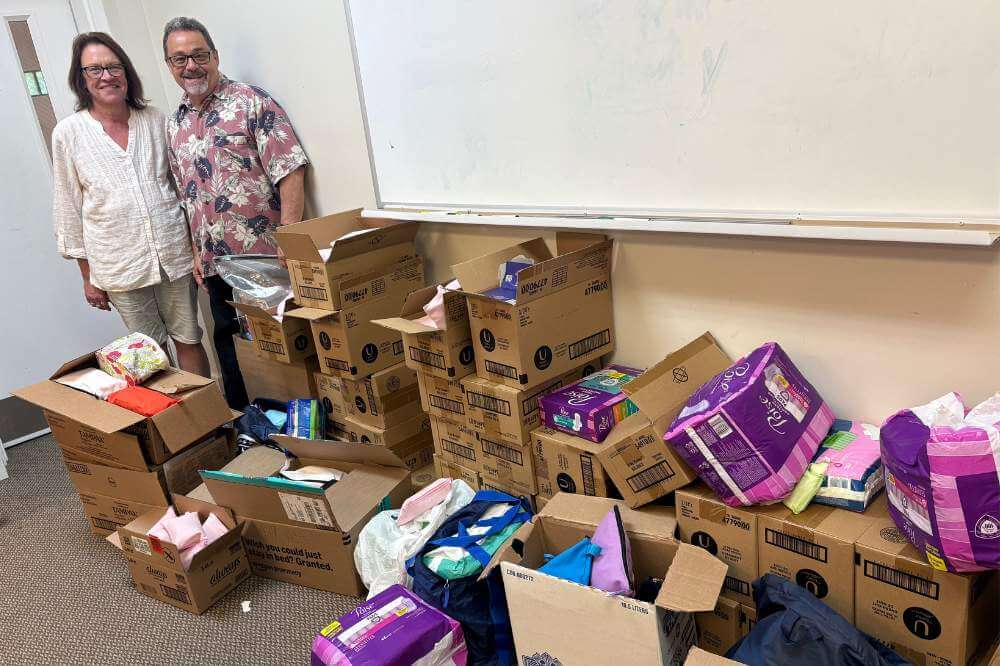LDR Carolinas Coordinators Pastors Ruth Ann and Ray Sipe present a check to Pastor Alice Johnson Curl, Trinity, Rocky Mount, to provide recovery aid to Rocky Mount neighbors following a tornado earlier this year.
While Lutheran Disaster Response Carolinas Coordinators and Network Builders (for both Carolinas), Pastors Ruth Ann and Ray Sipe may talk with more people at large events like synod assemblies or fall leadership convocations, the most important conversations they have are probably the ones with small groups.
Those can be conference gatherings of rostered ministers where they can take time to explain what Lutheran Disaster Response (LDR) Carolinas is and what they do. Even better are opportunities to talk with church members in congregational council meetings or adult Sunday school classes about the importance of preparedness.
A short article from the 2008 edition of ELCA’s Stories of Faith in Action explains the importance of these conversations:
When [an EF 4] tornado struck Enterprise, [Alabama] in March 2007, the members of Christ the King Lutheran Church were
Only 18 days before, two seminary students had come to this small city to give a presentation at Christ the King on behalf of Lutheran Disaster Response (LDR). Prior to the presentation, many members of the congregation had never heard of LDR…
The members of Christ the King started putting together their congregational plan, and several members agreed to serve on a disaster preparedness committee. Just over two weeks later, a devastating storm tore through the city, destroying two schools, leveling portions of downtown and residential areas, and killing eight high school students.
When Lutheran Disaster Response personnel arrived the next morning to begin assessing the situation, members of Christ the King were their first contacts. The church was soon named as the volunteer reception center for anyone coming to help, and within a month, nearly 4,000 volunteers participated in work projects around Enterprise.
LDR Carolinas’ Pastor Ruth Ann continues the story:
In case you did not guess, Ray and I were the two seminary interns who visited Enterprise, Alabama to talk about preparedness. We also had the opportunity to return after the disaster to work with the members of the congregation as they served their community.
This article was originally published to explain the importance of donations to support LDR. We are sharing it now to explain the potential impact of meeting with us to discuss preparedness.
Contact us to schedule a weekday meeting with congregational leaders or a Sunday event including worship. We would be glad to preach and connect the Good News with preparedness and ministry to serve your community when a disaster occurs.
Other upcoming opportunities to connect with LDR Carolinas are:
- Attend an LDR Carolinas’ Disaster Response Network Meeting via Zoom. The next opportunity is Thursday, November 30, at 7 p.m. Use this link to register to learn about upcoming opportunities for disaster response work, ongoing projects, the LDR Carolinas Disaster Response Network, and other resources.
- Join an upcoming 6-week book study using A Ready Hope: Effective Disaster Ministry for Congregations. Participate as an individual or gather a group from your congregation to consider how prepared you are, how a disaster could affect your community, and how your congregation could provide care to others. Beginning Tuesday, January 2, 2024. Learn more and register today.
Read the original article from Stories of Faith in Action here. [Inset photo from ELCA article, “Prepared to Care”]
Supporting the work
So, how does my Mission Support giving help to fund the work of Lutheran Disaster Response and Lutheran Disaster Response Carolinas, you might ask? Maryn Olson, director of Lutheran Disaster Response, answers in this way:
As you know, LDR’s work in disaster response and recovery always happens through relationships and in communities. Congregational Mission Support given to synods and subsequently to the churchwide organization supports most of the work of the ELCA through the ELCA’s annual budget. This giving makes possible the church’s presence and builds up the relationships of the ELCA at the regional, national, and international levels. Without an ELCA there is no Lutheran Disaster Response.
In terms of LDR’s disaster program activities, disaster-specific staff, and volunteer support: all of that is “above and beyond” general Mission Support and is made possible only because of designated giving by individuals and congregations to Lutheran Disaster Response (not through the regular budget). We are grateful for the generous and faithful support from individuals, congregations, and synods to these ministries, just as we give thanks for the ongoing support for the ELCA’s ministry and mission in the world.
This work cannot happen without your support: through Mission Support giving and direct designated giving to specific disaster relief efforts. Thanks be to God for the ways you and your congregation support this critical work of helping other in times of greatest need.
Story Attribution:
Synod Staff



